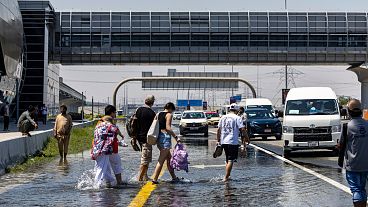From solar power to electric mobility, this study offers five reasons to be hopeful about the climate.
With emissions still rising and natural disasters wreaking destruction around the world, it’s no wonder that climate anxiety is at an all-time high.
But hope is not lost. Five major shifts have taken place since the Paris Agreement was signed in 2015, a new study asserts.
While terms like decarbonisation and net zero have become part of everyday parlance, this hasn’t always been the case. By acknowledging how far we’ve come over the past decade, we can see where we’re making gains - and where we’re falling short.
From solar deployment to electric mobility, here are five ways we’re heading in the right direction, according to the study by German non-profit NewClimate Institute.
5. Climate change discourse has become mainstream
A decade ago, only parts of society were meaningfully aware of and concerned about climate change.
That has undergone a sea change in recent years. In 2014, a BBC survey covering 17 countries around the world showed that 40 per cent of respondents perceived climate change as a serious issue. By 2020, this number rose to 60 per cent.
The broader ‘Peoples Climate Vote’, carried out in 2021 by the UNDP and University of Oxford across 50 countries, showed an even more definite shift.
In Eastern Europe and Central Asia, 85 per cent of respondents considered climate change to be a global emergency. 72 per cent of Western Europeans and North Americans agreed, along with 64 per cent of people in Arab states, 63 per cent in Latin America, the Caribbean and Asia Pacific, and 61 per cent in Sub Saharan Africa.
The issue is now central in public and political discourse around the world. Growing media coverage of climate issues, along with their inclusion in education, has armed citizens with knowledge of their causes and impacts.
In parts of the world that are already feeling the effects of climate change, the learning curve has been a lot steeper.
But as climate protests and social movements grow in strength, pressure is mounting on governments and businesses to take action.
And where they fall short, advances in attribution science have made it possible to hold them accountable in court through climate litigation. This year alone Portuguese youths, a UK environmental charity and Swedish activist Greta Thunberg have taken their countries to court.
4. Most countries are aiming for net-zero - and temperature rise predictions are lower
From governments to big business, net zero goals are ubiquitous. But back in 2015 only one country - Bhutan - had set such a target.
Now over 90 countries, representing nearly 80 per cent of global emissions, have joined it.
In the past, policy debate centred on incremental emission reductions and trade-offs between sectors and countries, notes NewClimate Institute. But a fully decarbonised economy is now a mainstream vision, including in the Global South.
While we’ve got a long way to go to achieve these reductions and keep within the 1.5C limit, the projected emissions curve has flattened.
In 2015, the temperature was projected to rise by 3.6-3.9C by 2100. Today, that projection has come down to 2.7C.
3. Investors and businesses feel pressure to act on climate
Before the Paris Agreement, climate change was a niche topic among investors and businesses. Now, pressure is on to recognise it as a serious threat.
Many corporations now report on and disclose their climate impacts - some are even legally obliged to do so. As they seek to improve their credentials, low-carbon opportunities are gaining popularity and green innovations are driving change in traditional business models.
Demand for sustainable investments is on the rise. In 2021, 84 per cent of asset owners globally reported to be implementing or evaluating sustainable investment strategies compared to about 53 per cent three years earlier, according to PwC.
With a transition away from fossil fuels sealed at COP28 this month, the risk of stranded assets is pushing finance away from polluting energy sources and towards renewables.
And with citizens and governments becoming increasingly savvy to greenwashing campaigns, it’s getting harder for corporations to pull the wool over our eyes. For those that try to, climate litigation is a growing risk.
2. Renewables are now cheaper than fossil fuels
In the past, renewables could not compete with fossil fuels on cost or supply. That’s all changed in recent years.
Power systems are switching to flexible, decentralised models that include wind, solar and hydropower.
The speed of this transition has exceeded expectations, with the cost of solar, onshore and offshore wind falling by 60 to 90 per cent in the last 10 years, according to the IPCC. New renewables are now cheaper than new fossil fuels in 90 per cent of the world.
For every $1 (€0.91) invested in fossil fuels, $1.70 (€1.55) is now spent on clean energy. Five years ago, this ratio was 1:1, according to the International Energy Agency (IEA).
1. Electrification of buildings and transport is progressing rapidly
From electric cars to heat pumps, electrification has become central to the world’s decarbonisation strategy.
Combustion engine cars are being phased out in several countries and regions, including the European Economic Area (EEC), Canada, Chile and various US states - a policy that would have been inconceivable a decade ago.
EV charging points, affordability and the sheer number of cars on the roads still need work. But advancements in battery storage are starting to tackle some of these barriers. In the last 10 years, lithium-ion batteries have become commercially viable - dropping in cost by 80 per cent.
Heat pumps are helping to decarbonise our homes, driven by financial incentives that are now available in over 30 countries which account for more than 70 per cent of the current global heating demand. Sales in Europe rose by 38 per cent from 2013 to 2022. Heat pumps are also increasingly being tested in industrial settings.
Innovation and investment is also helping to decarbonise ‘hard to abate’ sectors like shipping and heavy industry. Hydrogen steel, electric ships and low-carbon fuels are among the biggest developments.
Despite all these gains, “the climate crisis itself is accelerating at an ever-faster pace”, say the study’s authors. This highlights the urgent need to increase the momentum of these positive developments.



